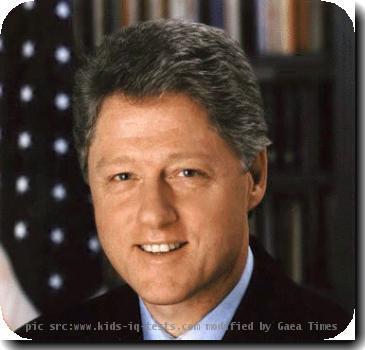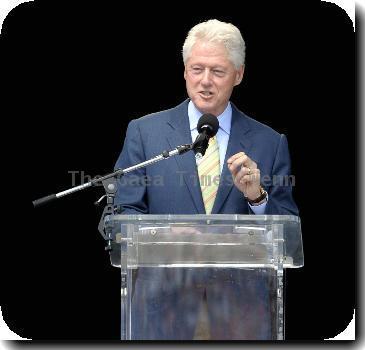With ex-President Carter in North Korea, Kim Jong Il slips over to China
By David Wivell, APThursday, August 26, 2010
NKorea’s reclusive Kim on unexpected China visit
JILIN, China — North Korean dictator Kim Jong Il has turned up in China in a strangely timed visit for the reclusive leader while former U.S. President Jimmy Carter is in North Korea trying to win the release of an imprisoned American.
It marked Kim’s second trip to China in three months — unusual for a man who never flies and travels only by armored train.
South Korean media and regional analysts said he may be seeking Chinese aid following flooding in his impoverished country’s northwest — and could be laying the diplomatic ground work for the succession of his son, who is thought to be traveling with him.
In any case, it was unclear whether he would return in time for a meeting with Carter, an elder statesman well-regarded in North Korea despite the two countries’ longtime animosity. Carter met with Kim’s father, late President Kim Il Sung, on his last trip to Pyongyang in 1994 — a warm meeting that led to a landmark nuclear disarmament deal.
Neither country announced the trip; Kim’s travels typically are not publicized by North Korea until after his return.
But his stop in Jilin city in northeastern China was confirmed by two teachers at the Yuwen Middle School, a school Kim’s father once attended that carries historic and patriotic significance for North Koreans.
“He definitely came over. But I’m not sure if his son was with him or what time he came,” said a physical education teacher who would give only his surname, Zhao.
Another teacher said Kim visited the school in the morning for about 20 minutes. He refused to give his name.
Kim Il Sung attended the school from 1927 to 1930 after his family fled the Japanese occupation of Korea. Kim biographies say he began absorbing communist ideology while at Yuwen, making it pilgrimage site for North Koreans seeking to pay homage to the one-time anti-Japanese guerrilla fighter-turned-president.
Such a visit just days before the 100th anniversary of Japan’s colonization of Korea carries symbolic weight as well. North Korea tends to play up the Kim family’s patriotism during succession campaigns.
Kim Jong Il watchers will be eager to see television footage or photos of the 68-year-old leader to check his health. In video run by Chinese Central Television in May, Kim appeared thin but vigorous during meetings with China’s President Hu Jintao and other officials, despite having reportedly suffered a stroke in 2008.
South Korea’s Yonhap News Agency reported that Kim checked into the Jilin Crystal Hotel, and roads leading to the secluded luxury hotel were blocked by police. The hotel’s website advertises plush suites, a billiard room, swimming pool and sauna, with a scrolling banner in broken English that reads: “Loosely expressing one-self and let the mood flying high.”
It wasn’t clear how many rooms Kim booked but Yonhap and YTN television in Seoul said he may be traveling with a son to consult with Chinese officials on succession plans.
It’s widely believed that Kim is preparing to transfer power to his third and youngest son, Kim Jong Un, and many North Korea watchers predict the son will be appointed to a key party position at a rare ruling Workers’ Party meeting early next month.
“Kim is at a crucial crossroads — whether to hold the party’s conference as scheduled or delay it until after they’ve recovered from floods,” said Cheong Seong-chang, a senior analyst at the Sejong Institute think tank outside Seoul. “Kim desperately needs Chinese food aid to hold the party’s conference as planned.”
The flooding earlier this month damaged or destroyed more than 7,000 homes, and wiped out bridges and railways, the North’s official Korean Central News Agency reported Thursday. China has already offered aid to help North Korea cope, KCNA said.
The North faces chronic food shortages and has relied on outside aid to feed its people. Seeking to improve its meager economy, Pyongyang has experimented with limited market reforms and sought foreign investment, mostly from China and South Korea. But joint projects with South Korea have withered in the face of tensions, heightening Pyongyang’s reliance on Beijing.
For its part, China is certain to use Kim’s visit as an opportunity to prod North Korea toward rejoining international talks aimed at nuclear disarmament.
China has hosted the six-nation talks since 2002 but North Korea walked away from them last year in protest over the international condemnation that followed its testing of a long-range missile. Prospects for restarting negotiations were undermined further after a South Korean warship sank in March, killing 46 sailors. Seoul and Washington accuse North Korea of torpedoing the vessel, while the North denies involvement and has threatened harsh retaliation if punished.
It is not known who Kim was to meet on this trip, although someone of his stature would likely meet a senior leader. The Tokyo Shimbun reported that Chinese Vice President Xi Jinping was headed to Jilin to meet Kim.
Still, North Korea watchers puzzled over the timing of the visit — so soon after his last trip to China and during Carter’s visit.
“He should be seeing Carter, but perhaps he has lost all hope in the U.S.” said Cui Yingjiu, a retired professor of Korean language at Peking University in Beijing who was a schoolmate of Kim’s in the 1960s and retains ties to the North Korean elite.
U.S. officials have stressed that Carter’s trip is an unofficial, private visit to negotiate the release of 31-year-old Aijalon Gomes, an American sentenced to eight years of hard labor in a North Korean prison and fined some $700,000 for entering the country illegally.
However, such visits, like the journey by ex-President Bill Clinton a year ago to secure the release of two American journalists, also offer an opportunity for unofficial diplomacy between the U.S. and North Korea.
Analysts said Carter and Kim could still meet Friday, after Kim returns to Pyongyang and before Carter’s departure.
Associated Press writer Jean H. Lee and Kwang-tae Kim in Seoul and AP researcher Zhao Liang in Beijing contributed to this report.
Tags: Asia, Beijing, Bill Clinton, China, East Asia, Greater China, Hu Jintao, Jilin, North America, North Korea, Pyongyang, Seoul, South Korea, United States

